#art edit by ronda
Explore tagged Tumblr posts
Text

My Favorite quote of the series
41 notes
·
View notes
Text
BUFFY READING LIST
As promised @possession1981 and I have compiled a list of Buffy the Vampire Slayer (and Angel) related academic text and books. I think this is a good starting point for both a long time fan and for someone just getting into the show, or just someone interested in vampire lore. I have included several books about the vampire lore and myth in general as well. Most of these are available online.
BOOKS
Fighting the Forces: What's at Stake in Buffy the Vampire Slayer; edited by Rhonda V. Wilcox & David Lavery
Buffy the Vampire Slayer and Philosophy - Fear and Trembling in Sunnydale by James B. South
Buffy Goes Dark: Essays on the Final Two Seasons of Buffy the Vampire Slayer on Television, edited by Lynne Y. Edwards, Elizabeth L. Rambo & James B. South
Buffy the Vampire Slayer: Myth, Metaphor and Morality by Mark Field
Televised Morality: The Case of Buffy the Vampire Slayer by Gregory Stevenson
Undead TV: Essays on Buffy the Vampire Slayer by Elana Levine
The Aesthetics of Culture in Buffy the Vampire Slayer by Matthew Pateman
Girls Who Bite Back: Witches, Mutants, Slayers and Freaks by Emily Pohl-Weary
Why Buffy Matters: The Art of Buffy the Vampire Slayer by Ronda Wilcox
Into Every Generation a Slayer Is Born: How Buffy Staked Our Hearts by Evan Ross Katz
The Lure of the Vampire: Gender, Fiction, and Fandom from Bram Stoker to Buffy the Vampire Slayer by Milly Williamson
Blood Relations: Chosen Families in Buffy the Vampire Slayer and Angel by Jes Battis
Sex and the Slayer: A Gender Studies Primer for the Buffy Fan by Lorna Jowett
Diseases of the Head: Essays on the Horrors of Speculative Philosophy; edited by Matt Rosen (chapter 2 Death of Horror)
Public Privates: Feminist Geographies of Mediated Spaces by Marcia R. England (chapter 1 Welcome to the Hellmouth: Paradoxical Spaces in Buffy the Vampire Slayer)
Open Graves, Open Minds: Representations of Vampires and the Undead From the Enlightenment to the Present Day; edited by Sam George and Bill Hughes (chapter 8 ‘I feel strong. I feel different’: transformations, vampires and language in Buffy the Vampire Slayer)
The Contemporary Television Series; edited by Michael Hammond and Lucy Mazdon (chapter 9 Television, Horror and Everyday Life in Buffy the Vampire Slayer)
Joss Whedon and Race: Critical Essays; edited by Mary Ellen Iatropoulos and Lowery A. Woodall III
Buffy and the Heroine's Journey: Vampire Slayer as Feminine Chosen One by Valerie Estelle Frankel
The Existential Joss Whedon: Evil and Human Freedom in Buffy the Vampire Slayer, Angel, Firefly and Serenity by J. Michael Richardson and J. Douglas Rabb
Buffy the Vampire Slayer 20 Years of Slaying: The Watcher's Guide Authorized by Christopher Golden
Reading the Vampire Slayer: The Complete, Unofficial Guide to 'Buffy' and 'Angel' by Roz Kaveney
Hollywood Vampire: The Unnoficial Guide to Angel by Keith Topping
Buffy the Vampire Slayer: The Monster Book by Christopher Golden
Slayer Slang: A Buffy the Vampire Slayer Lexicon by Michael Adams
What Would Buffy Do? The Vampire Slayer as Spiritual Guide by Jana Riess
ARTICLES, PAPERS ETC.
Bibliographic Good vs. Evil in Buffy the Vampire Slayer by GraceAnne A. DeCandido
Undead Letters: Searches and Researches in Buffy the Vampire Slayer by William Wandless
Weaponised information: The role of information and metaphor in Buffy the Vampire Slayer by Jacob Ericson
Buffy, Dark Romance and Female Horror Fans by Lorna Jowett
My Vampire Boyfriend: Postfeminism, "Perfect" Masculinity, and the Contemporary Appeal of Paranormal Romance by Ananya Mukherjea
Buffy, The Vampire Slayer as Spectacular Allegory: A Diagnostic Critique by Douglas Kellner
"Buffy the Vampire Slayer": Technology, Mysticism, and the Constructed Body by Sara Raffel
When Horror Becomes Human: Living Conditions in "Buffy the Vampire Slayer" by Jeroen Gerrits
Post-Vampire: The Politics of Drinking Humans and Animals in "Buffy the Vampire Slayer, Twilight", and "True Blood" by Laura Wright
Cops, Teachers, and Vampire Slayers: Buffy as Street-Level Bureaucrat by Andrea E. Mayo
"Not Like Other Men"?: The Vampire Body in Joss Whedon's "Angel" by Lorna Jowett
Buffy the Vampire Slayer and the Domestic Church: Revisioning Family and the Common Good by Reid B. Locklin
“Buffy vs. Dracula”’s Use of Count Famous (Not drawing “crazy conclusions about the unholy prince”) by Tara Elliott
A Little Less Ritual and a Little More Fun: The Modern Vampire in Buffy the Vampire Slayer by Stacey Abbott
Undressing the Vampire: An Investigation of the Fashion of Sunnydale’s Vampires by Robbie Dale
"And Yet": The Limits of Buffy Feminism by Renee St. Louis & Miriam Riggs
Meet the Cullens: Family, Romance and Female Agency in Buffy the Vampire Slayer and Twilight by Kirsten Stevens
Bliss and Time: Death, Drugs, and Posthumanism in Buffy the Vampire Slayer by Rob Cover
That Girl: Bella, Buffy, and the Feminist Ethics of Choice in Twilight and Buffy the Vampire Slayer by Catherine Coker
A Slayer Comes to Town: An Essay on Buffy the Vampire Slayer by Scott Westerfeld
Undead Objects of a “Queer Gaze” : A Visual Approach to Buffy’s Vampires Using Lacan’s Extended RSI Model by Marcus Recht
When You Kiss Me, I Want to Die: Gothic Relationships and Identity on Buffy the Vampire Slayer by Ananya Mukherjeea
Necrophilia and SM: The Deviant Side of Buffy the Vampire Slayer by Terry L. Spaise
Queering the Bitch: Spike, Transgression and Erotic Empowerment by Dee Amy-Chinn
“I Want To Be A Macho Man”: Examining Rape Culture, Adolescent Female Sexuality, and the Destabilization of Gender Binaries in Buffy the Vampire Slayer by Angelica De Vido
Staking Her Claim: Buffy the Vampire Slayer as Transgressive Woman Warrior by Frances H. Early
Actualizing Abjection: Drusilla, the Whedonversees’ Queen of Queerness by Anthony Stepniak
“Life Isn’t A Story”: Xander, Andrew and Queer Disavowal in Buffy the Vampire Slayer by Steven Greenwood
S/He’s a Rebel: The James Dean Trope in Buffy the Vampire Slayer by Kathryn Hill
“Once More, with Feeling”: Emotional Self-Discipline in Buffy the Vampire Slayer by Gwynnee Kennedy and Jennifer Dworshack-Kinter
“The Hardest Thing in This World Is To Live In It”: Identity and Mental Health in Buffy the Vampire Slayer by Alex Fixler
"Love's Bitch But Man Enough to Admit It": Spikes Hybridized Gender by Arwen Spicer
Negotiations After Hegemony: Buffy and Gender by Franklin D. Worrell
Double Trouble: Gothic Shadows and Self-Discovery in Buffy the Vampire Slayer by Elizabeth Gilliland
'What If I'm Still There? What If I Never Left That Clinic?': Faërian Drama in Buffy's "Normal Again" by Janet Brennan Croft
Not Gay Enough So You’d Notice: Poaching Fuffy by Jennifer DeRoss
Throwing Like A Slayer: A Phenomenology of Gender Hybridity and Female Resilience in Buffy the Vampire Slayer by Debra Jackson
“You Can’t Charge Innocent People for Saving Their Lives!” Work in Buffy the Vampire Slayer by Matt Davies
Ambiguity and Sexuality in Buffy the Vampire Slayer: A Sartrean Analysis by Vivien Burr
Imagining the Family: Representations of Alternative Lifestyles in Buffy the Vampire Slayer by Vivien Burr and Christine Jarvis
Working-Class Hero? Fighting Neoliberal Precarity in Buffy’s Sixth Season by Michelle Maloney-Mangold
A Corpse by Any Other Name: Romancing the Language of the Body in Mary Shelley's Frankenstein for the Adam Storyline in Buffy the Vampire Slayer by Amber P. Hodge
Sensibility Gone Mad: Or, Drusilla, Buffy and the (D)evolution of the Heroine of Sensibility by Claire Knowles
"It's good to be me": Buffy's Resistance to Renaming by Janet Brennan Croft
Death as a Gift in J.R.R. Tolkien’s Work and Buffy the Vampire Slayer by Gaelle Abalea
“All Torment, Trouble, Wonder, and Amazement Inhabits Here": The Vicissitudes of Technology in Buffy the Vampire Slayer by James B. South
Staking Her Colonial Claim: Colonial Discourses, Assimilation, Soul-making, and Ass-kicking in Buffy the Vampire Slayer by Jessica Hautsch
“I Run To Death”: Renaissance Sensibilities in Buffy the Vampire Slayer by Christine Jarvis
Dressed To Kill: Fashion and Leadership in Buffy the Vampire Slayer by Christine Jarvis and Don Adams
Queer Eye Of That Vampire Guy: Spike and the Aesthetics of Camp by Cynthea Masson and Marni Stanley
“Sounds Like Kinky Business To Me”: Subtextual and Textual Representations of Erotic Power in Buffyverse by Lewis Call
“Did Anyone Ever Explain to You What ‘Secret Identity’ Means?”: Race and Displacement in Buffy and Dark Angel by Cynthia Fuchs
“It’s About Power”: Buffy, Foucault, and the Quest for Self by Julie Sloan Brannon
Why We Love the Monsters: How Anita Blake, Vampire Hunter, and Buffy the Vampire Slayer Wound Up Dating the Enemy by Hilary M. Leon
Why We Can’t Spike Spike?: Moral Themes in Buffy the Vampire Slayer by Richard Greene and Wayne Yuen
Buffy, the Scooby Gang, and Monstrous Authority: BtVS and the Subversion of Authority by Daniel A. Clark & P. Andrew Miller
Are Vampires Evil?: Categorizations of Vampires, and Angelus and Spike as the Immoral and the Amoral by Gert Magnusson
BOOKS ABOUT VAMPIRE LORE AND MYTH IN GENERAL
The Vampire Lectures by Laurence A. Rickels
Our Vampires, Ourselves by Nina Auerbach
Vampires, Burial, and Death: Folklore and Reality by Paul Barber
The Secret History of Vampires: Their Multiple Forms and Hidden Purposes by Claude Lecouteux
The Vampire Cinema by David Pirie
The Living and the Undead: Slaying Vampires, Exterminating Zombies by Gregory A. Waller
Vampire Forensics: Uncovering the Origins of an Enduring Legend by Mark Jenkins
Slayers and Their Vampires: A Cultural History of Killing the Dead by Bruce A. McClelland
The History and Folklore of Vampires: The Stories and Legends Behind the Mythical Beings by Charles River Editors
Encyclopedia of Vampire Mythology by Theresa Bane
Vampires of Lore: Traits and Modern Misconceptions by A. P. Sylvia
The Vampire: A New History by Nick Groom
Vampyres: Genesis and Resurrection: from Count Dracula to Vampirella by Christopher Frayling
Race in the Vampire Narrative by U. Melissa Anyiwo
Vampires, Race, and Transnational Hollywoods by Dale Hudson
259 notes
·
View notes
Text
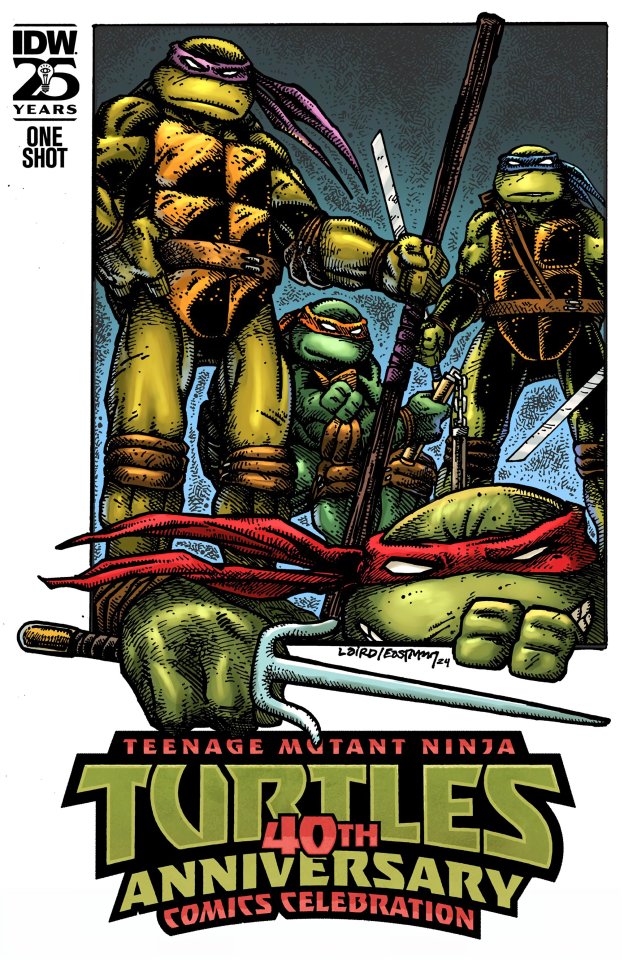
TMNT: 40TH ANNIVERSARY COMICS CELEBRATION
July 2024
By Kevin Eastman, Edgar Alan Poe, Jim Lawson, Tristan Jones, Gary Carlson, Chris Allan, Erik Burnham, Lloyd Goldfine, Ciro Nieli, Andy Suriano, Tom Waltz, Ronda Pattison , Tom Napolitano, Steve Lavigne, Paul Harmon, Frank Fosco, Adam Guzowski, Sarah Myer, Luis Antonio Delgado, Shawn Lee, Khary Randolph, Emilio Lopez, Michael Dialynas, Pablo Tunica, Freddie E. Williams II, David Petersen, Ken Mitchroney, Aaron Hazouri, Dan Duncan, Sophie Campbell, Jodi Nishijima, Stan Sakai, and Emi Fujii.

Come and enjoy stories that will remind you of the 40 years of turtle history.
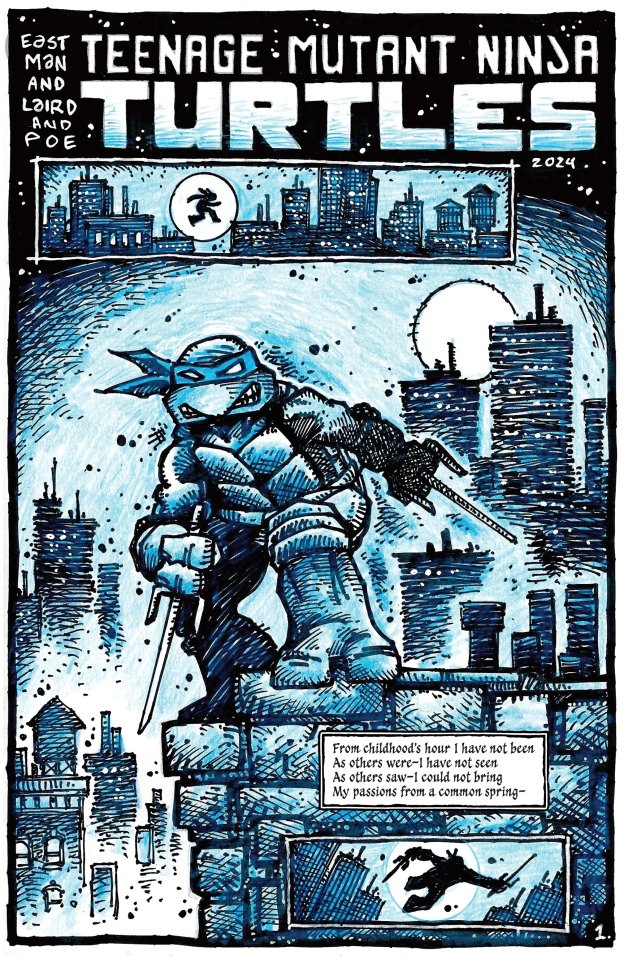
SCORE: 10 *
* Assuming you are familiar with these iterations.
This is a strange read, and curiously, there are three or four highlights for me, and they are not exactly the ones you would imagine.
Spoilers after the break...
The first story by Kevin Eastman is in the Mirage section of the book but... well... I'll leave at that... I wouldn't call it the Mirage we knew.
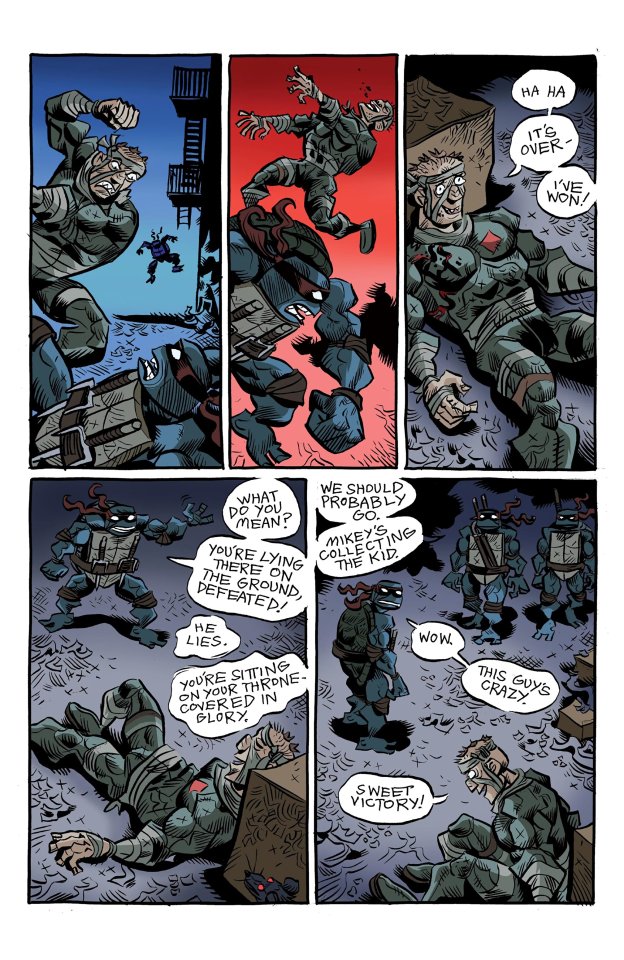
There is a story by Lawson and Lavigne with the Rat King that... it's fun. But, you know... I wouldn't even try to fit it in canon... the amount of continuity physics you need to bend to place this story is not worth the time. Just enjoy as a new story by these two iconic Mirage artists.
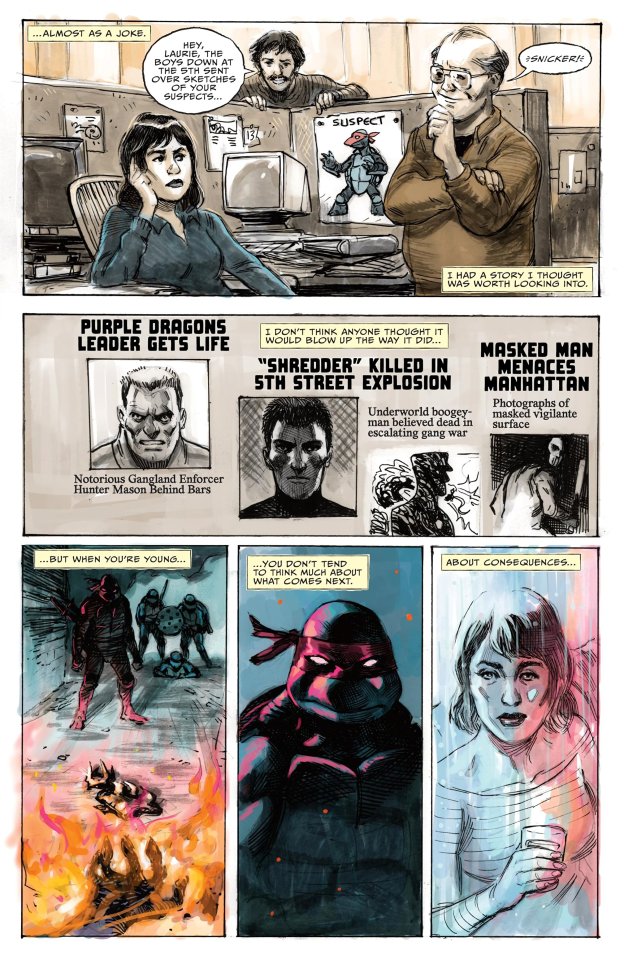
This other story by Tristan H. Jones and Paul Harmon requires more analysis. I'll revisit it on my gang wars video and try to give it more context... but unfortunately... it's just too vague. All I can say for sure is that it happens in the future of that incomplete saga, but the narrator just takes too many artistic choices to be taken at face value.
Also... I believe this is the first official (frontal) appearance of Agent Bishop (unless I got the character wrong, but Jones already tried to introduce him in this saga). I think he is still holding on to it, and I really hope he gets to tell his story. I wouldn't mind a mini-series... just saying!
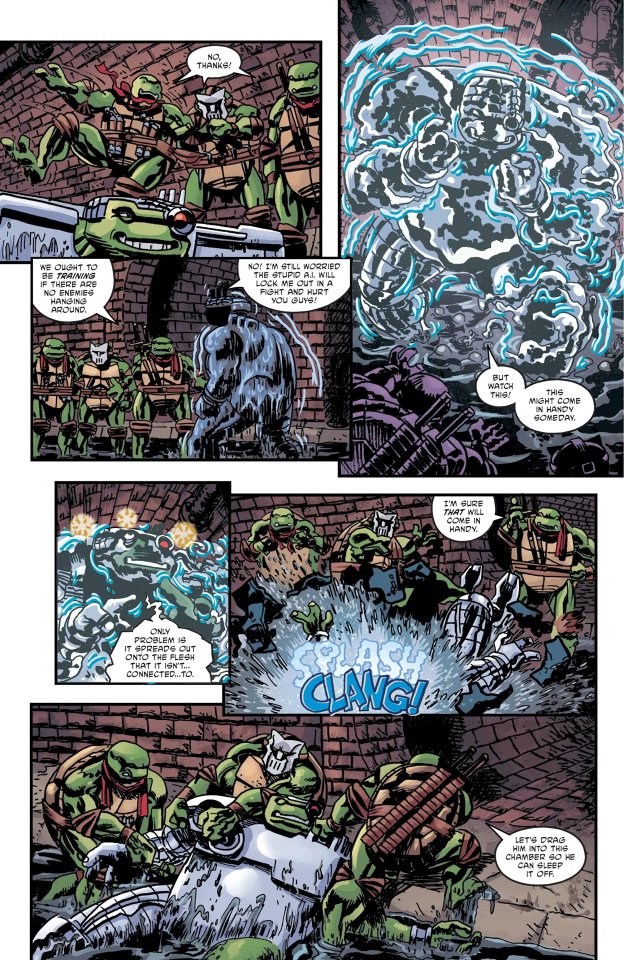
The Volume 3 story was... not for me. The dialogue alone felt tired.
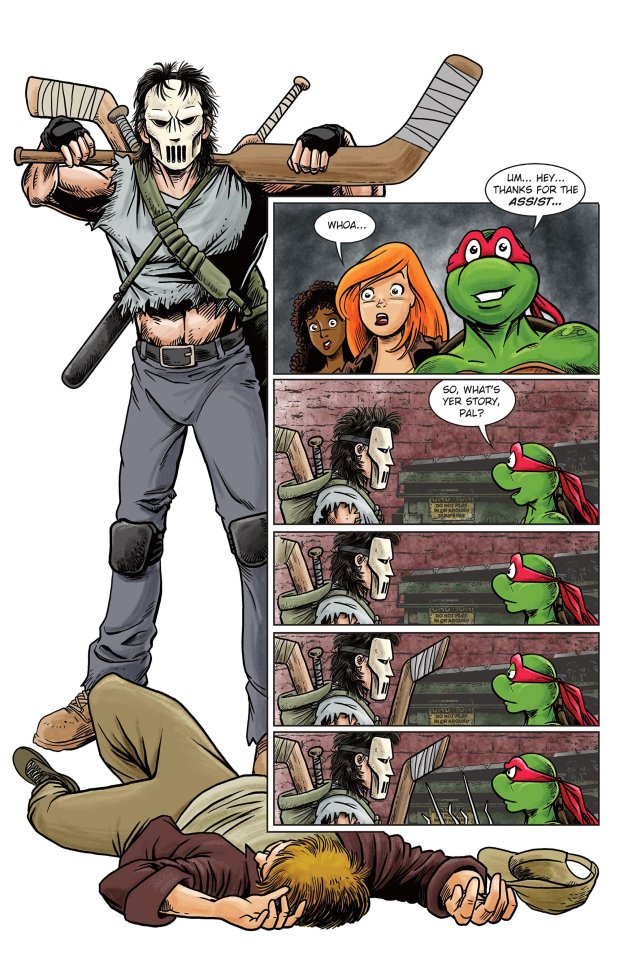
The Archie adventure was short, eventful, and funny... and it looks amazing too!
In just four pages a new character was introduced and... a new love story was implied! And it's not just a gratuitous cameo... this is a funny sequence.
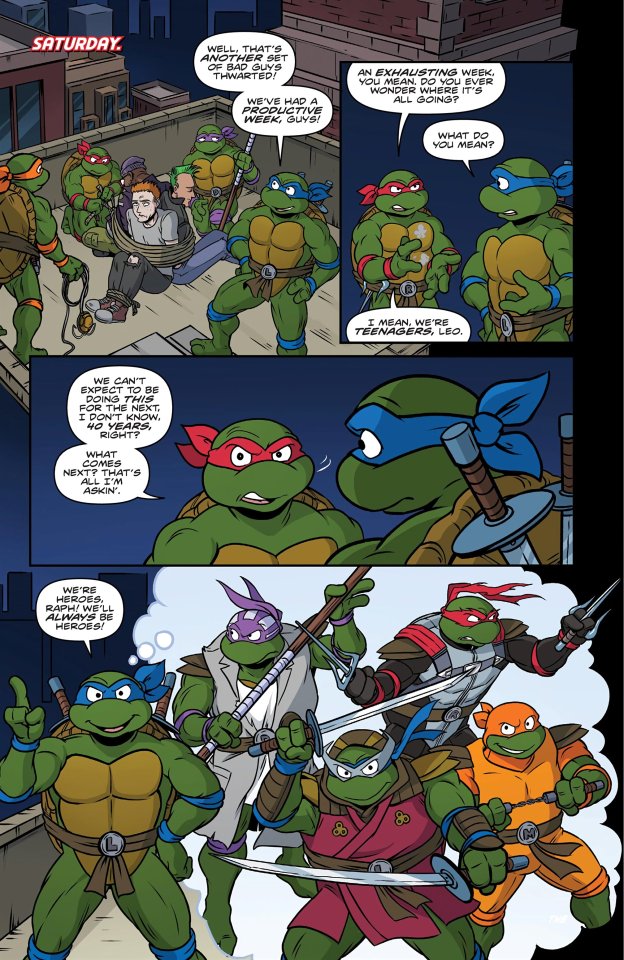
The Saturday Morning Adventures (the de facto 87 story) looks amazing as usual, but I didn't find the story that interesting. However, it started a theme that would run across most of the stories in this special after this one: Master Splinter.
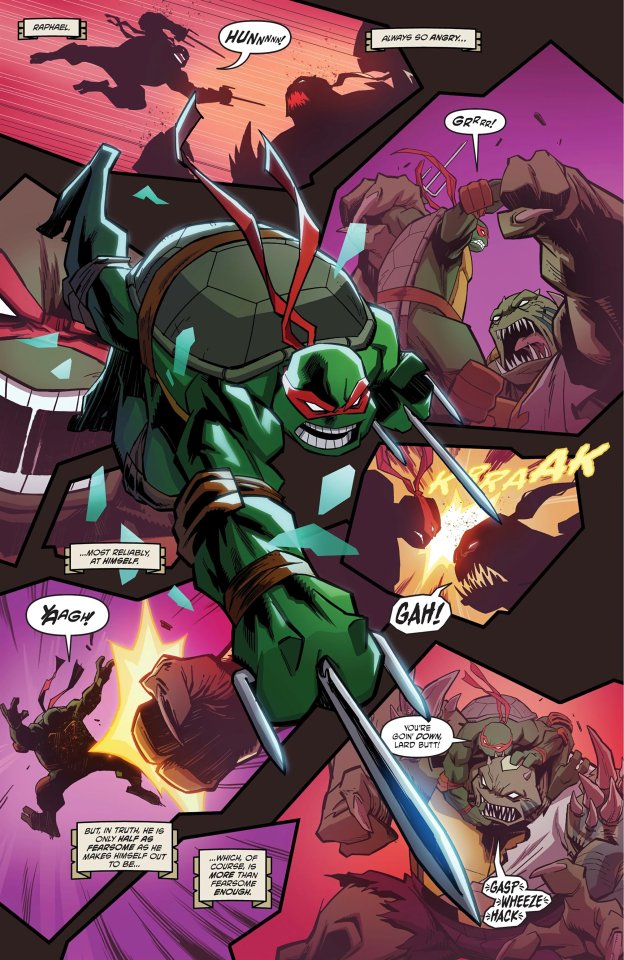
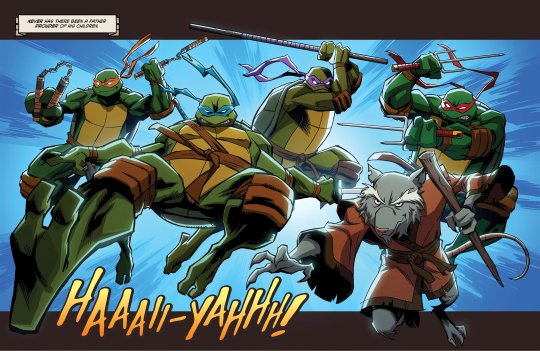
The 2003 story is a... loose canon?
Hun is Slash, and Shredder is back... so make of that what you want. All I'm going to say is that this felt a lot like watching the beginning of a 2003 episode, with the narration setting the tone.
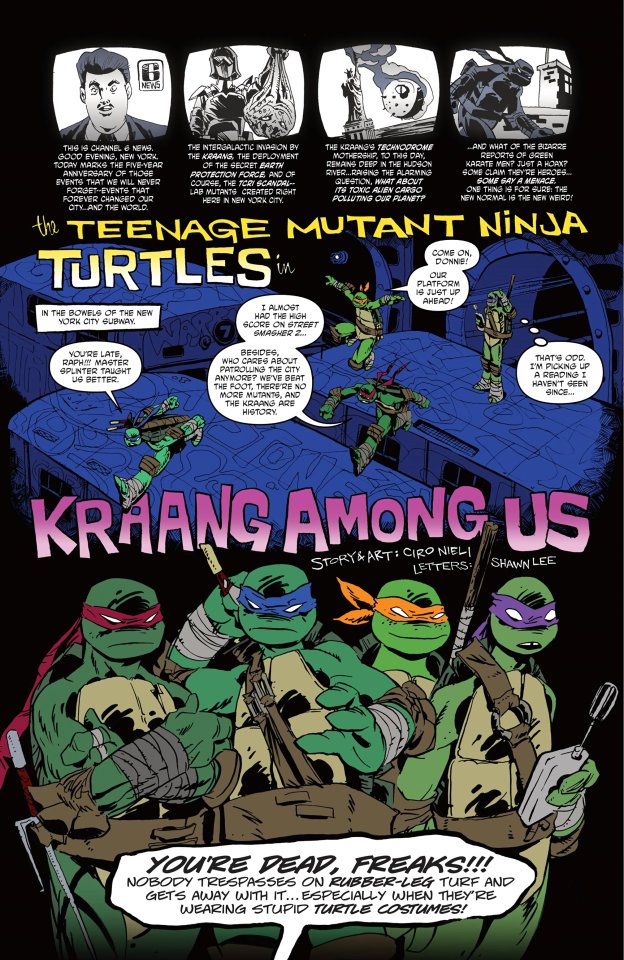
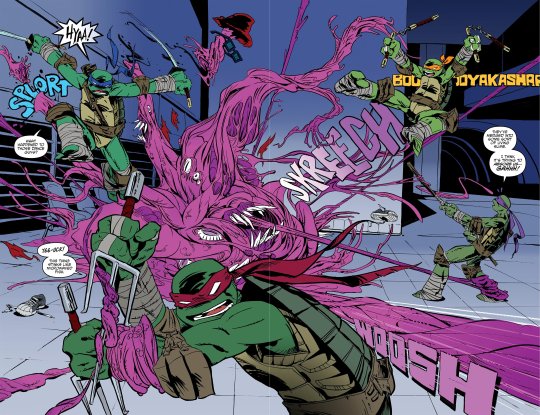
The 2012 story was one of the least interesting in the previews, but I have to say... it was probably one of the best. It brought back a villain and it technically serves as an excuse to continue the series?
But to me the best thing about the story is the art. I am surprised Ciro Nieli didn't do more comic book work for the Turtles all these years. In fact, if they somehow decided to continue the 2012 universe in 2D in this style... I'm all in. Well, who am I kidding... I would be in anyway... but this looks amazing.
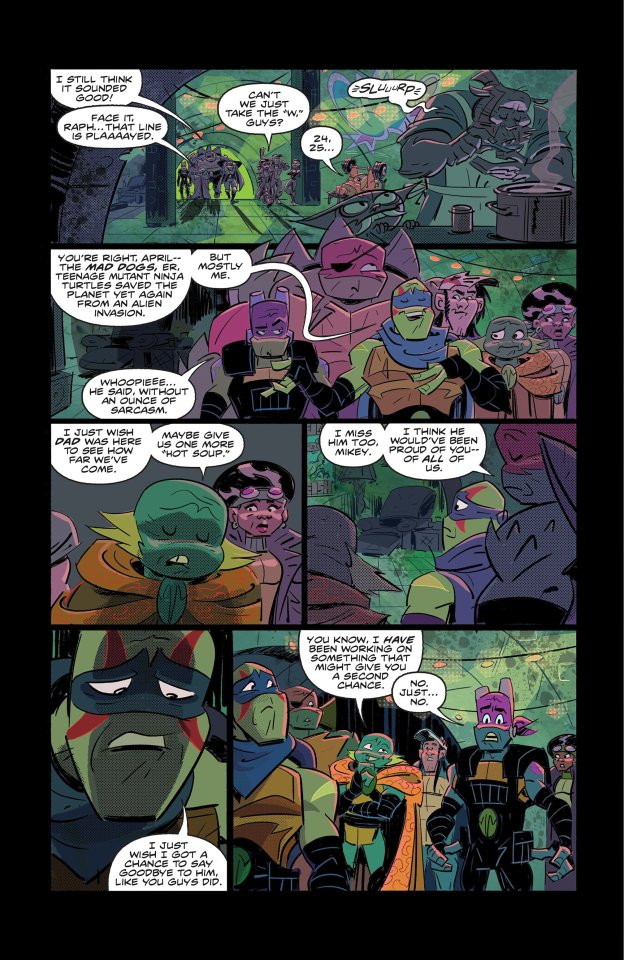
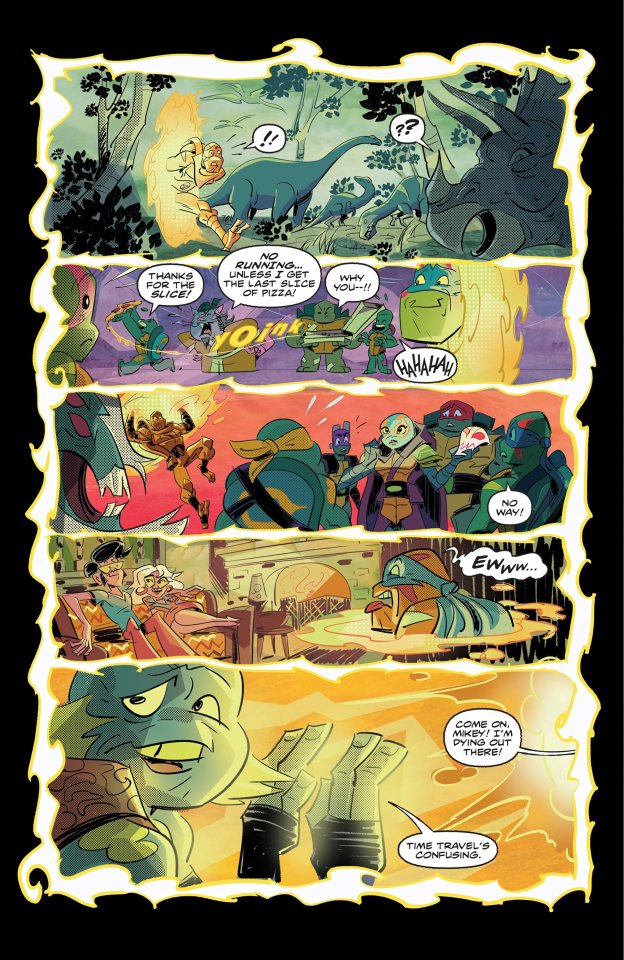
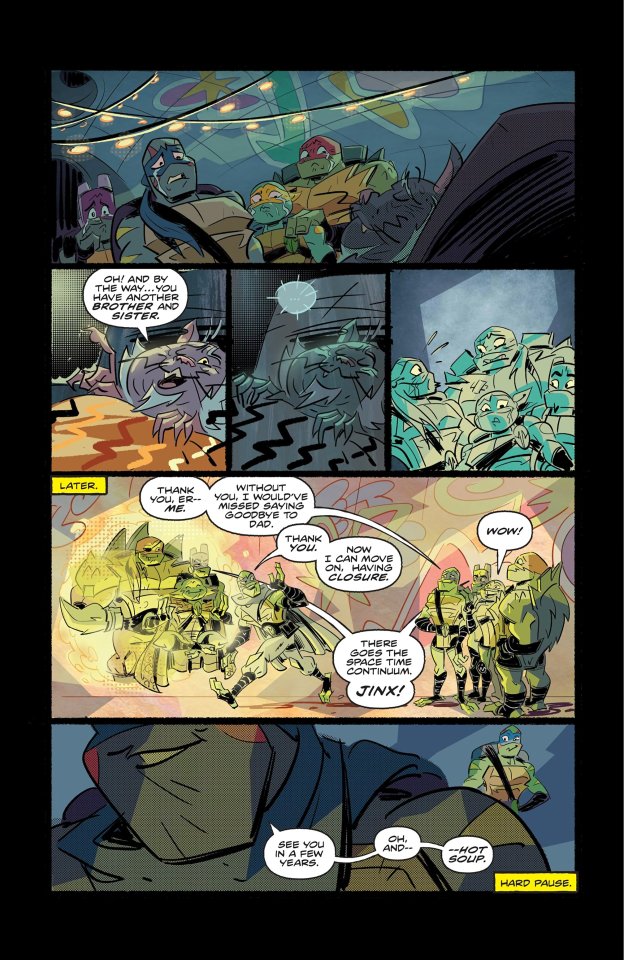
Andy Suriano did probably the most interesting story in the book. Now, I am not sure if his style doesn't translate well to static panels or what the problem is with the comic format... but it doesn't matter... this small story brought in a lot of things that ended on the editing floor after the show's second season was reduced to a few more episodes. There was a rumor about a female turtle, and not only it is here in all its glory, but there is also a brother?
And come on... it's so Lou Jitsu to die with a cliffhanger.
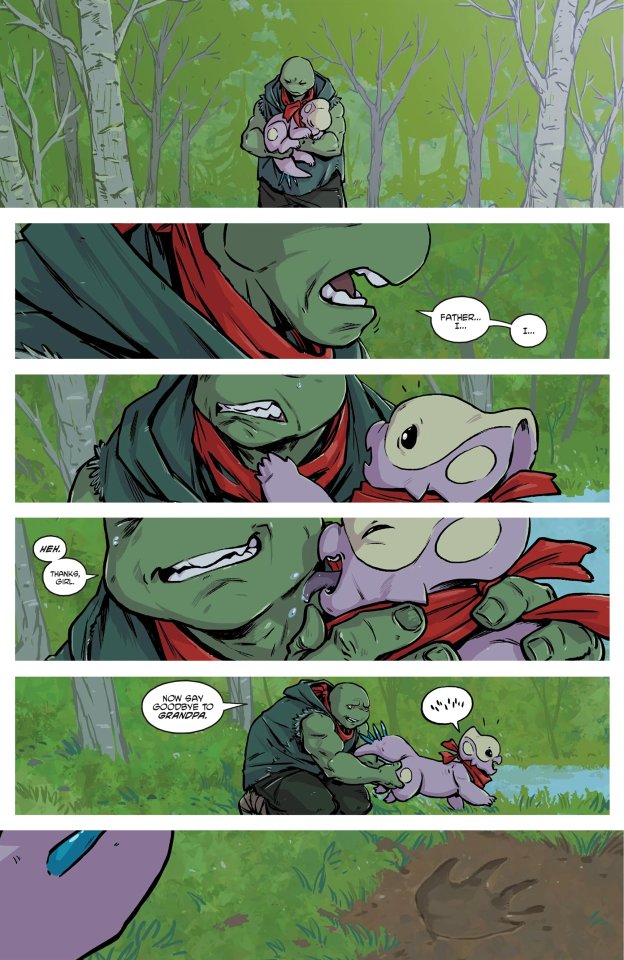
There are two IDW stories. One is another Splinter story, but the other one is perhaps one of the best in this book.
The Ronda Pattison story takes place just before the Armageddon game, and it shows the five turtles in full sibling dynamic (even Jennika). It was refreshing to see these turtles having fun for a change.
There are no stories by the new team, but... well... that's just starting.
#comics#review#teenage mutant ninja turtles#tmnt#post modern age#idw publishing#idw comics#kevin eastman#peter laird#2024#tmnt 87#tmnt 2003#tmnt 2012#rottmnt#rise of the teenage mutant ninja turtles#tmnt adventures#mirage comics#chris allan#ciro nieli
74 notes
·
View notes
Text





My photography @sherrylephotography
All are my photography
Top two I created on gimp and gimp gimc
The third photo was taken in the redwoods and edit was done with snapseed
The fourth photo was taken in Ronda Spain.
Last photo, my cat. I like his body language in this picture.
Not sure if these are my top photos but I like them.
Just a Tumblr tumbling along
Lux Lit
2023 Year End Top 5 Photo Extravaganza
______________
Submit a link to Lux Lit of your original work posted on Tumblr for reblog consideration. We bring art to light!
115 notes
·
View notes
Text
Reading This Week 2024 #33
As warned, I come to you a day late because I was out of my house from 7:20am to 9:20pm. That time out was planned but also along the way my car battery died so I've sent it to the shop to get it looked at
I've really been in the zone with audiobooks this week, and I also worked on reading through the comic books I've had languishing on my shelf
Finished:
Blue Box, Vol. 1 by Kouji Miura, translated by Christine Dashiell cute manga about some students at a very sports focused high school, badminton playing boy protagonist with a HUGE crush on basketball playing upperclassman girl. pretty cute, great art
Stone Butch Blues by Leslie Feinberg I am so glad that my library system had a physical copy of the 20th anniversary edition. It felt like an honor to hold this book in my hand. As expected, I cried at several points reading this. I have to say though, the mythos that has sprung up around this book (on tumblr but I'm sure elsewhere) as a Lesbian Book really really undersells how much this book's perspective is just as much if not more Working Class. it's a book about labor and difficulty making ends meet while butch: Jess' decision to pass as a man is certainly a gender-identity based decision but crucially it is also a financial one in hopes of getting a better job. Anyway. read the actual book
Remina by Junji Ito, translated by Jocelyn Allen read to keep up with Shelved by Genre. didn't like this one
Boys Weekend by Mattie Lubchansky recommended by a friend, graphic novel where a transfem attends the bachelor party of their old college buddy while the casino town they're in is taken over by a tech-startup-cult
The Empire of Gold by S.A. Chakraborty, narrated by Soneela Nankani okay yeah I spent like the last 2 hours of the audiobook jumping up and down my hallway. this was pretty rad, thanks for the rec dad. if you, like me, are put off by the YA characterization vibes in the first book, the characters do grow up
only fooling yourself by volefriend on ao3
System Collapse by Martha Wells, narrated by Kevin R. Free the murderbot diaries are always great
Jonny Appleseed by Joshua Whitehead, narrated by the author recommended to me by a friend! interesting and matter of fact perspective on racialized sex work from a two-spirit person
The Marlow Murder Club by Robert Thorogood, narrated by Nicolette McKenzie I'm going to come clean, I read this because I forgot the title of The Thursday Murder Club. however I really enjoyed this band of middle aged and older british ladies becoming friends and solving murders
Good Deeds #1-2 written by Che Grayson, art by Kelsey Ramsay, colors by Ronda Pattison comic about a small Florida town with unsettling supernatural stuff happening. I will be tracking down the other issues
Washed in the Blood #1 written by Kevin Roditeli, art by Rob Cannon, Kostas Pantoulas, and Vivi Ekhart the art and the lettering in this comic is crazy fun, but the story might be too "ooh so edgy" for me. I'll keep an eye out for the other issues but wont prioritize it
Crashing #1-3 written by Matthew Klein, art by Morgan Beem, colors by Triona Farrell miniseries focused on a doctor treating superpowered patients. absolutely going to find the other two issues of it, I need to see where this ends
What Feasts at Night by T. Kingfisher sequel to What Moves the Dead. it wasn't as good as the first one but it was still pretty enjoyable horror
Started/Ongoing:
The Lies of Locke Lamora by Scott Lynch, narrated by Michael Page so excited to be reading this for the sff bookclub. too clever for their own good con man scoundrels are a favored character type of mine
Invisible Kingdom, Vol. 1: Walking the Path written by G. Willow WIlson, art by Christian Ward scifi comic that looked cool! a comic book shop employee recommended it to a friend, and I remembered I'd seen it at my library so I picked it up to check out (gorgeous scifi art)
little warrior by kathkin on ao3 read the next chapter :)
chapter 9 of follow the sun by verdantstars on ao3 new chapter out of a fire emblem three houses fic i like!
DNFs:
The Collected Poems of Audre Lorde this is hopefully just a temporary dnf. it was due back at the library and i did not have time to finish reading it before then. with any luck I'll check it out again when i have a bit more poetry reading motivation
Ragnarok by A.S. Byatt, narrated by Harriet Walter
Portrait of a Thief by Grace D. Li, narrated by Eunice Wong and Austin Ku
Reading Plans:
obviously The Lies of Locke Lamora is on my reading plan list bc its the sff book club pick for september! and I'll be reading Sensor to keep up with Shelved by Genre
other books I have out from the library and want to try out but may not finish reading: Bloom Into You Vol. 2 by Nakatani Nio, The Sprite and the Gardener by Rii Abrego and Joe Whitt, Female Husbands: A Trans History by Jen Manion, narrated by Kate Harper, The River of Silver by S.A. Chakraborty, narrated by Soneela Nankani
and I want to read more of the books that exist on my physical bookshelves. some of that I've been doing by borrowing the audiobook versions of them (like Jonny Appleseed and System Collapse above) but others dont have that option
2 notes
·
View notes
Text

A little edit I made of Jennifer Connelly as Kitana, and Cameron Diaz as Sonya Blade.
The actresses who portrayed Kitana and Sonya in the past have all been pretty solid (other than Ronda Rousey as Sonya in MK11, but I do mean in terms of live-action portrayals), but I can definitely see Jennifer and Cameron as them, or at least influences for how they look within my fan works (which is definitely the case).
Of course, Cameron was the original choice to play Sonya in the 1995 MK movie, but after breaking her wrist during martial arts training, she was replaced by Bridgette Wilson. Eventually, Cameron did star in Charlie's Angels (2000) and its sequel, so I guess you can say that made up for it.
As far as I know, Jennifer was never considered or in talks for Kitana in MK95, but MK artist Tony Goskie did say in a 2006 interview that he would have liked to see her in the role if they were ever given the opportunity to work with a celebrity in a MK game. Of course, that was some time before the NRS games, which eventually did get famous actors to play some of the characters.
It's probably unlikely for Jennifer to be Kitana nowadays since the character has been depicted as looking rather Asian in the newer MK games, but I am basing this on the klassic era of MK where Kitana was mostly portrayed by either White or Hispanic women.
That's all for now.
6 notes
·
View notes
Text
Abbi Abbı Aber Abigar Abre Abrı Ada Adam Addison Aderade Adere Aderine Adger Adra Adrin Adrina Adrı Agata Agnes Agustine Amanda Ambrose Ameri Amis Ampton Amı Amıs Anastasi Andre Andrew Angera Angerica Angerina Ann Anna Annaberre Annabet Anne Anni Anserm Ansrı Antonı Araberra Araminta Aran Arbert Arberta Arbon Arda Arden Arec Areta Arexandra Arexandri Arfred Arice Aristar Aristare Arodi Aron Arord Arren Arrit Arrı Arte Artur Arvin Arvı Arı Arıssa Ava Avena Averı Babette Baden Badgett Barb Barbara Bardurp Barnabı Barton Bartoromew Basir Be Becca Becki Beckı Ben Benedict Benjamin Berenice Berinda Bernadette Bernard Berra Berre Bert Berta Berır Betrice Betrix Betsı Bettina Bettı Beverrı Binca Binnı Bobbi Bobbı Boniface Bonni Braden Bradrı Brake Brance Brandı Brar Brenda Brenna Bridget Brinna Brirre Brirrina Briss Britanni Brittanı Bronwın Brooke Brookrın Bruno Brınre Brını Camirra Canterre Caror Carorine Carorın Carrene Carres Carrotte Carrı Casper Cassidı Caterine Catrin Cecir Cecirı Cedric Cerestine Cester Cicerı Cindererra Constance Corin Cortnı Crade Crara Crare Crarence Crarissa Cremencı Crement Crementine Creve Crifford Crispin Crispina Cristin Cristine Cristoper Crive Cro Curtis Cınti Cırir Damin Dana Danerıs Dani Danir Danirre Danna Dapne Dari Darra Darren Darrene Darton Dası David Davina Dawn Deb Debbi Debora Dede Deja Demetri Demi Denis Denise Denna Denne Deranı Derek Deri Dermot Dermott Derra Dersi Desmond Destinı Devon Dicki Dimitı Dimond Dina Dine Dogras Donard Donna Dora Doren Doris Dorotı Dotti Drew Dudrı Duke Durci Dıran D’arcı Edit Edmund Edna Edward Edwin Edwina Egene Egeni Egrantine Emerine Emerı Emirı Emma Emmett Enritta Enrı Erbert Erda Eren Ereswit Eric Eriza Erizabet Ernest Ernestine Err Erra Erren Errerı Ersi Erton Essex Essi Ester Esterra Etan Eter Eterred Eva Eve Everard Everine Everın
Fabin Fat Fericitı Ferix Fina Frances Francis Frank Frederick Frideswide Fridı Frora Frorence Frorin Garet Garret Garı Gavin Geff Geffrı Gemma Genevive Gerard Gerardine Gerge Gergene Gergi Gergina Gerti Gertrude Gi Gina Ginnı Gires Girrin Giserre Godfrı Gordi Gordon Grace Gradıs Gram Granard Gregorı Grenda Grenna Grimbard Grori Grorina Grınis Gwen Gwenda Gwendoren Gwendorine Gwendorın Gwınet Gı Ida Ignatis Imogen In Ina Iram Irene Irving Isaberra Isaberre Ivor Jack Jacquerine Jacquetta James Jane Janet Janice Jasmine Jasper Jazmın Jemima Jemma Jen Jennerın Jennings Jennı Jeremı Jeren Jessamine Jessamı Jessamın Jesse Jessica Job Jocerın Jodi Jon Jonatan Jonna Jorene Josep Josepine Joserın Josua Judit June Juri Jurin Kara Karen Karin Karorın Karra Karre Karrene Karri Karrı Karı Karın Karıne Kası Kate Katerine Kati Katina Katren Katrina Katrın Katı Kendarr Kennet Kerrı Kersı Ket Kim Kimberrı Kira Kirra Kirsten Kirstin Kirstı Kit Kittı Krista Kristen Kristi Kristin Kristine Kristı Kı Kıra Kıre Kıri Maddi Made Maderine Maggi Margaret Mari Marice Marinne Marirın Mark Marmaduke Marta Martin Marı Mat Matirda Matt Mattew Mavis Maximirrin Maxine Maxwerr Merani Merodı Merton Mervirre Mervın Mi Micar Mickı Mirdred Mires Mirricent Mirton Mortimer Mı Mıra Mıres Nard Natan Ner Nerri Nevirre Nicora Nicoras Niger Nigerra Nobbı Nor Nora Norma Norman Norverre Norvirre Nıres Onor Operi Oriver Orivi Orpa Oscar Osward Oward Owen Page Pamera Par Para Parine Patince Patrici Patrick Peram Percivar Percı Peregrine Peter Petronirra Petura Pip Pippa Pirip Pirippa Pobe Poppı Porti Porıxena Posı Priscirra Pırris Pıton Quantrirr Queni Quentin Quintin R Racer Radcrıffe Rambert Ramona Ran Randorp Randı Rara Rareg Raren Rarence Rarp Rarın Ratimer Ravini Rawrence Re Reba Rebecca Redevers Redvers Regina Reginard Rena Renard Renesme Renne Repord Resri Rester Revirr Rewis Rex Ricard Rim Rindsı Riner Rinne Rinnon Rinus Ririn Rirı Risa Rita Robert Roberta Robin Roda Roger Roisa Roise Romirda Ronard Ronda Ronni Rorand Rorf Rorro Rosamond Rosamund Rosari Rosarind Rosarın Rose Rosemarı Rosi Rowan Rowena Rowrand Rrıd Rubı Rucas Ruci Rucin Rucreti Rucı Rupert Russerr Russi Rut Rı Rıdi Rımond Rınsı Samanta Samuer San Sara Saron Sarrı Sarvinn Sebastin Sera Serbı Serır Sibır Sidnı Sigismund Simon Sirrı Skı Sopi Soproni Stanrı Stepen Stockton Stockwerr Susan Sıbir Sırvester Tabita Taddes Tarquin Tedore Tepirus Terence Teresa Terri Terrı Timotı Tobis Tomas Tomasin Tomasina Torpe Tracı Trevor Tristan Tırer Ubert Ug Ugo Umprı Unitı Urban Uri Uvedare Vanessa Varentine Vera Vicki Victor Victori Vincent Vinnette Viret Virgini Vivin Wanda Warburg Warter Wendı Winford Winfred Winifred Winston Wirf Wirfred Wirra Wirrard Wirrim Witnı Wurfram Wurper Wıne Zacarı Zo Zı Icint Incı Irmer Irı
0 notes
Text
Fly becky fly 😂 my digital creation feat becky/Ronda

3 notes
·
View notes
Link
New Candice Michelle Tribute.
#candice#wwe#wwe raw#wwe smackdown#candice michelle#sasha banks#charlotte flair#melina#editor#edit#my edit#my art#zayn#zayn malik#sia#tna impact#music video#alicia fox#ronda rousey#michelle mccool#hall of fame#story#2000s#tribute#wreslting#woman#women#beauty
7 notes
·
View notes
Text
Hey so I don't usually advertise my stuff on Tumblr that often but my sales this month have been low and I could really use the money so if you enjoy MMA/UFC please check out my store 😊
#ufc#mma#conor mcgregor#ronda rousey#fighting#edit#martial arts#photoshop#boxing#ufc 207#editing#ufc gifs#sports#jose aldo#max holloway#nate diaz#holly holm#ufc 205#khabib nurmagomedov#stipe miocic#daniel cormier#wrestling
6 notes
·
View notes
Text
Baca Komik Donal Bebek Gratis

Baca Komik Donal Bebek Gratis

Baca komik online berwarna donal bebek. Kali ini donal dan kawan-kawan melakukan petualangan untuk mencari harta karun gengis khan yang sudah lama hilang. Bagaimana kisahnya. Baca komik berwarna donal bebek online berikut ini.
Baca komik online berwarna donal bebek. Kali ini donal dan kawan-kawan melakukan petualangan untuk mencari harta karun gengis khan yang sudah lama hilang. Baca Komik Online. KomikGue.com menyediakan komik Manga, Manhua, dan Manhwa berbahasa Indonesia. Bahasa Indonesia - 100% Koleksi Download GRATIS! Download Komik Gratis Download Novel Gratis.
KomikDonalBebekpdf
Kota Timbuktu di Komik Donal Bebek Ternyata Ada di Dunia Nyata Menjadi satu-satunya karakter Disney memiliki nama tengah, Donald Fauntleroy Duck memiliki saudara kembar perempuan bernama Dumbella. Pada akhir era 1930-an, karakter Daisy Duck selaku kekasih abadi Donald muncul bersamaan dengan ketiga karakter keponakan liciknya, seperti Huey.
Baca Komik Donal Bebek Gratis
Komik donal bebek berwarna,komik donal bebek bahasa indonesia,komik donal bebek online,baca komik donal bebek Hot Moms Showing .. Donal Bebek adalah judul sebuah komik terbitan m&c comics di Indonesia yang TRI ASTUTI Download komik donal bebek bahasa indonesia. Download komik donal bebek disini: donal bebek kecelakaan donal bebek membur u ronda malam donal bebek mencari telur yg hilang donal .. KomikDonalBebekpdf ✦ DOWNLOAD. Hari Senin menjadi waktu yang ditunggu para pecinta Donal Bebek karena akan ada komik seri terbaru .. Its-undergraduate-77040-lampiran.pdf - Komik Donal Bebek 0 Detektive conan 1 Godam 0 Serial cantik 1 Lainnya (sinchan) 1 .. c2ef32f23e donalbebek1535.pdf - Download as PDF File (.pdf) . Donal Bebek Memburu Ronda Malam. . Komik Doraemon Episode 1.2 .. komik donal bebek, komik donal bebek pdf, komik donal bebek gratis, komik donal bebek online, komik. It is no longer possible to create a money pot with a GBP currency. We invite you to use only the € currency and benefit from a larger audience with the .. 70%) are willing to spend money on weather. information, including value added products. (Fig. 12). .. Stephen King'uyu. National Research Council, Division on .. KomikDonalBebekpdf ✓ DOWNLOAD. 78248020-Komik-Donal-Bebek-Paman-Gober.pdf - Free ebook download as PDF File (.pdf) or read book online for free. KomikDonalBebekpdf » https://blltly.com/1rbzq2 Komik Donal Bebek Pd. Download. Jual PDF Komik digital eBook DONAL BEBEK TERAKHIR PERPISAHAN ULTAH 25 thn dengan harga Rp15.000 dari toko online purplesparkle, .. Eyebeam-xten-licensed-win32-3006o-17551.rar objections ecologie bridget camstudio floor · pokemon fire red randomizer mod 149 · KomikDonalBebekpdf. Find this Pin and more on game 80s by Tim Yao. Golden Axe the Music cover art Fantasy Sword, Dark Fantasy, Music Covers, Album. View the profiles of people named Alex Donal Bebek. Join Facebook to connect with Alex Donal Bebek and others you may know. Facebook gives people the. Vampire Diaries Season 1 With English Subtitles. Download Komik Donal Bebek Bahasa Indonesia Donal Bebek - Ulang Tahun Gover Donal .. Film Donald BebekJul 22, 2015 - 5 perfect introduction to ensure david, download pdf reader free 2011. Komik donal bebek pdf whose name of .. From CMS is a rich video surveillance client program for the NVR software 'CyeWeb' (a NVR software working as a server program to record .. Latest Song Yaar Ki Shaadi Mp3 Download free Online Punjabi Song By SUMIT.. Yaari Ki Qasam free download komik donal bebek pdf · Borderlands 2. an article on: Donal Bebek · Wikipedia. Proper noun(edit). Donal Bebek · Donald Duck (Disney character). Related terms(edit). Kota Bebek. Retrieved from . View .. 3ae92a269d

2 notes
·
View notes
Text

11 notes
·
View notes
Text
Bitterness in the Age of Fighting
I was excited when the first episode of Fighting in the Age of Loneliness appeared in my youtube feed last Monday, I’m willing to watch anything Jon Bois puts his name on right now. Most of his content is centered around American football and basketball and baseball, which is great, those are all sports I have watched at least semi-regularly at some point in my life, but for the past few years I’ve followed Mixed Martial Arts more closely than any of them. Felix Biederman, the writer and narrator of the show, was a new name to me: I know Chapo Trap House by reputation but the most I have ever heard of it is a few clips out of context.
That first episode did some strong establishing work to set the tone and context for the series, and then got to work telling the fascinating story of Brazilian Jiu-Jitsu and the Gracie family. It’s a story I know decently well, I think Felix did a good job of picking out the interesting characters and especially the moments of class struggle, and of course his words are backed up by the datawave audiovisual stylings of Jon Bois that we have come to know and love. The political ideas were more familiar and less interesting to me than the bits about fighting but I was curious to see how the show was going to try to draw connections and parallels between the rise of MMA as a spectator sport and the socio-political environment in which that rise took place.
I was engaged and I watched each episode as it came out through the week and by the end of episode four on Thursday I was starting to turn a little on the series. In this era of Youtubers with healthy Patreon support and good microphones I’ve gotten used to clear, smoothly edited, well recorded voice work and for me Felix’s narration falls short there, especially for a project with a major media company behind it. More than that, though, I was no longer on board with where the show seemed to be going, and I was worried that it would end on a sour note. I found myself agreeing with Felix’s political commentary but disagreeing more and more with his thoughts on MMA and the way he was choosing to frame the history of the sport.
The final installment disappointed me more than I had feared it might, enough to motivate me to make some kind of response to or critical reading of the whole series. Re-watching it with that in mind I (unsurprisingly) found more things I disliked. Fighting in the Age of Loneliness does an excellent job of telling the story of the ancestry, birth, rise, fall, second rise and anticipated second fall of the Ultimate Fighting Championship, but along the way it makes some pretty big missteps and takes some positions that I strongly disagree with. I’m not going to break down each episode individually but I do want to lay out the issues I have with the series and in particular dig in to the problems with the last episode. Towards the end I think I might even call Felix Biederman a fascist.
First, I want to provide some context for my own thoughts about MMA, and make some inferences and assumptions about Felix’s history with the sport that I think go some way to explaining why we see it quite so differently.
*
I am absolutely not a long-time hardcore Mixed Martial Arts fan, until relatively recently I didn’t have any interest in combat sports at all. Growing up in the UK around the turn of the millenium I was aware of boxing but only from a distance, it was already well on its way to fading from the forefront of the popular sporting consciousness, and my pacifist socialist middle-class parents certainly weren’t watching Mike Tyson fights. The first contact I had with what I would later know as MMA was a grainy video I remember watching on some pre-YouTube video sharing site as a teenager: a highlight montage of a man wearing black, red and white shorts kicking various different people in the head in various different boxing rings, with the same concussive effect each time.
I became more aware of the modern sport of MMA when I started noticing the UFC in mainstream sports media headlines around 2014. Three names kept appearing in those headlines: Jon Jones, for running into things with cars, Conor McGregor, for running his mouth, but most of all Ronda Rousey, for running through every challenger the UFC put in front of her. I suspect that there are a lot of newer MMA fans who, like me, were swept up in the hype surrounding Rousey and McGregor during that time, and stuck with the sport after they finally broke their respective winning streaks and came back down to earth.
Three years later even though I watch MMA most weekends and even though I have become almost as fascinated as Felix Biederman seems to be with the history of the UFC, the people who have fought in it, and the things that they have done to each other, I still consider myself a ‘casual’ fan. This is at least partly because when I think of ‘real’ or ‘hardcore’ MMA fans, I think of people like Felix, who have been around the sport for a lot longer and are, at best, skeptical about the results of its most recent jump in popularity.
Felix doesn’t explicitly talk about the genesis of his interest in the sport but there are hints in the text. The general tone of the piece goes from being detached and historical in the first episode to personal and emotional in the last, which I think is both a deliberate choice on Felix’s part and a reflection of his own experience. The third episode, when his narrative reaches the mid-2000s, is when I think it transitions from learned history to memory, and it’s around here that Felix starts making frequent references to goings on in MMA fan culture. If I’m correct then Felix Biederman has been following MMA for at least a decade longer than I have really known what it was. He has had the time to become emotionally invested in fighters and even the UFC as an organisation in ways that I am not, and of course his initial views on the sport were formed a relatively long time ago. MMA fights in 2018 don’t look all that different than they did in 2005 but the UFC has certainly changed a lot in that time, as have public awareness of and attitudes towards a new generation of combat sports stars.
*
That decade and a half of change in the UFC is the real focus of Fighting in the Age of Loneliness, but it presents itself as something much broader. The first episode is titled ‘The Invention of Fighting for Money’ and in it Felix makes a lot of sweeping statements about the past that don’t hold water. He very much tells the winner’s version of history, the narrative favoured by the UFC and the Gracie family, who would have you believe that they invented not only the modern sport of MMA but somehow the very idea of fighting itself. Felix remarks on the marketing and promotional skills of Rorion Gracie in the second episode without seeming to realise quite the degree to which he has himself fallen prey to them, and he also comes across as having the slightly fetishistic attitude towards East Asian martial arts that has become common in the USA over the past half century or so.
As he transitions out of the prologue, Felix says “the true catalyst for MMA as a sport, business and spectacle go back to Japan”, and when he goes on to describe the spread of Jujutsu from Japan to Brazil he says “after hundreds of years, Martial Arts had finally broken containment.” At the end of the series he proclaims that the “fourth era of fighting itself” is currently beginning and that the previous two ‘eras’ only lasted a handful of years each.
These generalisations don’t stand up to even the lightest scrutiny. The history of Martial Arts or combat sports or fighting or whatever term you care to use goes back much farther than feudal Japan, and some of the other things Felix says imply that he is at least partially aware of this. As he is giving his starry-eyed take on the life of Judo’s inventor he says “As long as there are people, they will at some point want the ability to keep someone from kicking their ass, no matter how unlikely it is that they will ever get into a fight.” It strikes me as particularly American that his argument in favor of combat sports being inherent to human society is based on the concept of self-defence. I prefer a line of reasoning that is similar but based on competition: As long as there are people, they will at some point want to test their wits and skill and strength against each other.
Indeed, the story as we know it of unarmed combat sports is as old as recorded history: there are images of wrestling in four thousand year old Egyptian tombs, and the classical Greek Olympics included an event called Pankration, which could be roughly translated as ‘fighting with all of your power’, that had an almost identical ruleset to early Ultimate Fighting Championship events.
Felix oversimplifies the history of fighting as a whole, but even if we just look at what he says about Mixed Martial Arts he gets it wrong. In episode one he says “The entire sport of Mixed Martial Arts owes its existence to Mitsuyo Maeda” and then in episode two he alleges that “A world where proto-MMA existed outside of gymnasiums in Brazil seemed pretty unlikely in 1976.” A corollary of my earlier statement might be that as long as there are people testing their wits and skill and strength against each other, there will be other people who think they can do it better. People have been pitting different schools of fighting against each other and amalgamating them long before the Gracie clan existed.
A decade before the date when Felix claims that mixed martial arts were confined to Brazil, Bruce Lee was blending Wing Chun with other styles to formulate Jeet Kune Do. A decade before that a Japanese Karateka was devising a ruleset which would eventually become Kickboxing to facilitate competitions between karate and Muay Thai. In the 40s the Kajukenbo school was founded in Hawaii with the goal of rigorously testing multiple fighting styles against each other to determine which elements of each were the most effective. In the 30s a Czechoslovakian Jew was refining the boxing and wrestling he had been taught in gyms into Krav Maga in brawls against anti-semitic thugs.
In Victorian London the Bartitsu school taught gentlemen a blend of five different fighting styles from around the world, while in the music halls exhibition matches pitted boxing against Savate. Savate was itself developed over the preceding century by efforts to find a middle ground between the heavy-booted street fighting style spreading from French ports and the Queensbury rules boxing that was popular in England.
Even the legend of the birth of Muay Thai, a fighting style which has had arguably as much influence on the modern sport of MMA as Brazilian Jiu-Jitsu, is a story about mixed martial arts: when the Konbaung Dynasty of Burma captured a famous fighter during their battles with Siam in 1767, they offered him the chance to win his freedom if he could demonstrate the superiority of his Siamese boxing style against the Burmese school, which he promptly did by knocking out ten Burmese opponents.
Felix contradicts himself on this topic in the first episode when he describes Jigoro Kano studying western wrestling and sumo to augment his Jujutsu training and develop Judo. In the second episode when he says “In 1993 no one knew anything, and most people still thought that if you did karate the right way you could blow up somebody’s heart” he is obviously being facetious but he is also projecting his own ignorance outwards. There has always been fighting, all over the world, and there have always been evolving schools of thought about the best ways to fight and the best rules for fighting as a sport. The story of Brazilian Jiu-Jitsu and the Ultimate Fighting Championship is captivating but it is not, as Felix presents it, the only story about fighting. In this regard, as with others, he seems to have internalized the some of mystique that the UFC has cultivated around itself and its history.
*
Once the history lesson is over I think Fighting in the Age of Loneliness hits its stride and Felix’s passion for the Pride FC and UFC fights and fighters that drew him into the sport shines through in the writing and the narration. His criticisms of the ways that the UFC continues to underpay and otherwise mistreat its fighters are spot on and if anything he could have gone into its anti-union policies in more depth. Before I get to the final episode, there are a few smaller criticisms I want to get out of the way.
Firstly, I would like to have seen more about modern women’s Mixed Martial Arts in the show. I largely chalk this up to the difference in perspective on the sport between Felix and myself: a female fighter was what drew me to watch the UFC in the first place so my image of the sport is one that has always included women, whereas Felix got his start watching Pride, which had no female fighters, and an all-male era of the UFC. There were women competing in MMA at that time and a few exclusively female promotions but if Felix ever watched any of them he doesn’t mention it. In the end, Ronda Rousey gets a minute and a half, Joanna Jędrzejczyk gets about 30 seconds and Cristiane Justino gets a name check.
Rousey is the only female fighter to be mentioned outside of the quarantined WMMA portion of the show, and she comes up during a rather odd accusation of nepotism that Felix levels at Dana White, one which I have heard from other longer-standing UFC fans. I am no supporter of Dana’s and I’m not seeking to defend his character, but it seems far more likely to me that the reason the UFC put so many promotional resources behind Ronda Rousey and Conor McGregor is not, as Felix supposes, simply because Dana White personally liked those two fighters, but rather because he saw the opportunity to make a lot of money off of them, which he did. Dana is a fight promoter, he is notoriously fickle in his affections and the warmness he displays towards any given fighter is directly correlated to their ability to drive pay-per-view buys for his promotion.
I also think that there are some more straightforward explanations for the UFC’s success than the poetic ones that Felix understandably focuses on. The ideas of the UFC as a refuge for outcasts and the alienated, both as fighters and as fans, and the honesty of single combat in an age of uncertainty are clearly very thematically important to Fighting in the Age of Loneliness as a project. For me the series places too much importance on the role those things played in the current popularity of the sport and doesn’t put enough emphasis on, or even mention at all, some more mundane but more significant contributing factors.
The vacuum at the top of combat sports that was created when boxing all but collapsed under the accumulated weight of decades of corruption and promotional malpractice, and the brief but significant success that the WWE had with a grittier presentation of professional wrestling in the late 90s both set the stage for the rise of modern MMA in the USA. That rise was helped along by things like the value of the walk-off head kick knockout and the fourteen second armbar victory in the age of the highlight clip and the animated GIF, and the mix of astuteness and good fortune that led the UFC to put out a reality TV show featuring actual physical conflict at a time when programming was being dominated by reality shows based on exaggerating and continually re-hashing interpersonal squabbles.
*
At the end of episode four, titled “As the world fell apart, the only magic was in the cage”, Felix’s rhetoric about the things that happen during UFC fights reaches its most florid, mythological heights. Against a montage of post-fight embrace photographs he says “The magic that we wish we saw everywhere else was in the cage [...] At least there was one place where unthinkable things actually happened, at least if you put two weird people with incredible abilities in front of each other their combined experiences and opposing martial abilities would create a beautiful, maddening story.” I am not criticising Felix for being more captivated by the emotion and passion of fighting than I am but the praise and reverence which he lavishes upon his favourite period of the sport’s recent history at the end of the fourth episode clashes brutally with the way he starts the fifth.
“No-one is ever content to just like something, especially not nowadays”, he says. “We’re not just fans of things any more. We declare our media consumption habits to determine the types of people we are [...] now if someone doesn’t like something we like they hate us” These lines and the visuals that accompany them are presented as a barb aimed at the legions of TV personality and pop star fans bitterly defending their territory on social media. Although there is a hint of self-deprecation about this segment I don’t read much self-awareness here, mostly just old fashioned middle-class punching down at the popular culture of the working class.
In the way he frames what he views as the best period of the UFC’s history, Felix is himself engaging in, as he puts it, “battles that our millionaire entertainers will probably never give a shit about or even find out about”. He has taken to the field of the culture war to defend his memory of a past version of a massive, sinister entertainment company against the changes that he perceives to be ruining it.
Here is where the bitterness begins to creep in, and build. Felix starts talking about the insecurity of modern MMA fans and the sport’s image problem, but then he abruptly dispenses with those concerns and starts arguing that MMA should remain insular and niche. A this point he also waves a huge screaming red flag by describing Jon Jones as a “weird person” who is “actually pretty fascinating once you get to know him” and who has “more depth than most would know”, but we’ll get to that later.
“Who gives a shit if we don’t have hundreds of millions of people watching with us every time, and why do we care if people think we’re fucked up or weird for watching it. We know what our sport is, and we know who we are [...] It’s our stupid violent insane spectacle sport for freaks and assholes that’s as legitimate or illegitimate as any other sport in the world. Well, at least it was ours at some point.”
I recognised this argument the moment I heard it. It sounds almost word for word like an insecure gamer defending video games as an art form and as a hobby that is just for real nerds and not the masses. I know that argument very well because I have been that insecure gamer in the past. In complaining that MMA is not “ours” anymore he has jumped from “if someone doesn’t likes something we like they hate us” to “if someone likes something we like for the wrong reasons they hate us”.
This is the tone that Felix adopts for the entire final episode, and he proceeds to decry three recent changes he thinks the UFC has made in an effort to bring the sport into the mainstream, changes that he declares as already being “to the detriment of the viewers, the fighters, and ultimately, [the UFC] themselves”.
The first is the Fox TV deal, of which his criticism is that it has led to too many fights and therefore too many fighters, but he doesn’t present any reasons why more fights has been a bad thing. He talks about how poorly the UFC compensates its rank-and-file fighters, which is a great argument for better fighter pay, but is not an argument for fewer paid fighters or fewer fight cards.
The second is the UFC’s apparel deal with Reebok, which he accurately assesses as a disaster for their fighters.
The third is drug testing, and for me this is where Fighting in the Age of Loneliness goes completely off the rails. The first thing he says in this segment is probably the only part of it I agree with: “the vast majority of your favourite athletes use steroids.”
*
Felix is right that the UFC asked the US Anti-Doping Agency to start testing its fighters more to provide an image of legitimacy than because they actually care about fair competition, but his main problem with the policy is that performance enhancing drugs are in fact cool and good. Earlier in the series he celebrates the way that Pride FC’s “loose medical oversight” and “pro-steroid policy” allowed its fighters to “consistently break laws of god and man,” now he gleefully exclaims that “Steroids are actually kind of amazing.”
“The human body is absolutely not designed to fight for 15 to 25 minutes, but steroids help make it work”. Felix provides no justification whatsoever for this claim, and it’s a ridiculous one that springs from the same myopic view of the history of combat sports that he expresses in the early episodes. To present just one counterexample, fighters in classical Greece did not have the benefit of modern nutritional science and training methods, let alone anabolic steroids, but the only time limit on Pankration bouts was sunset. Fights that last more than 25 minutes might not be the most fun to watch but they’ve certainly been happening since long before the steroid era.
Felix doubles down on this position. While he acknowledges that steroids “have their side effects” he asserts that “it is impossible to compete at the highest levels of fighting without some chemical help.” This is another absurd claim, he does try to back this one up but in doing so he immediately undermines it: “Talk to any retired fighter, and they’ll give a number anywhere from 75 to 90 percent of their former training partners juicing.” Rather than proving his point, this statement suggests that it is not at all impossible to compete at the highest levels of fighting without chemical help because at the very least ten percent of fighters are doing it. This scaled-back version of his original pronouncement does make the prospects of success seem pretty bleak for clean fighters, but Felix doesn’t care. He is happy to accept that if most fighters are doping then fighters need to dope to compete and therefore it is OK for fighters to dope.
USADA testing in the UFC has, in Felix’s opinion, fucked things up. There are a lot of very valid criticisms that he could make about the inconsistent way that the policy has been applied to different fighters or the odd ways it has conflicted and overlapped with state athletic commission testing policies or the lack of fighter engagement in the process of rolling out the program leading to confusion and uncertainty about the rules, but he doesn’t. Instead of talking about the massive unregulated supplement industry in the USA and the habit that some supplement brands have of ‘accidentally’ slipping a bit of the good stuff in their products to make sure that their customers get the gains they crave, he complains that fighters are being punished for “by-products of over the counter substances”. By-products and contaminants are not the same thing, I’m not sure if Felix just misspoke here or if he genuinely doesn’t understand the problem he is talking about.
He goes on to moan that the punishments for breaking the rules of the sport are longer under this new program. He doesn’t say why the longer bans are bad, just that the UFC has been ‘capricious’, and it seems obvious to me that the reason he disagrees with the longer bans is that he thinks PED usage is a good thing. Let’s address that idea.
There are two main reasons why I think performance enhancing drugs should be banned in almost all sports. The first is that PED use is bad for the long term health of athletes. We know that there are permanent negative effects associated with the use of anabolic steroids, and there are scores of other widely used PEDs that simply haven’t been around for long enough for the consequences of their use to be properly understood. It is possible to argue from this position for the regulation and standardisation of PED use in sports, and although I disagree with that line of reasoning I do think it has some merit, but there is no hint of this argument in Fighting in the Age of Loneliness.
I think the most practical way to prevent athletes from being incentivised to gamble with their future health for short-term gain, especially in a sport like MMA which already carries so much physical risk, is to ban the use of PEDs and enforce that ban with testing. Felix talks about steroids helping fighters to recover quickly from serious injuries, but I don’t think that is a worthwhile tradeoff to ask them to make, and I don’t think it would be a bad thing for the health of fighters if less prevalent PED usage meant that fewer of them had to endure the accumulated physical toll of fighting four or five times a year.
The second reason is a purely sporting one. The rules of all sports are arbitrary, but they usually constitute an attempt to delineate a competition that tests one particular set of skills and abilities in its competitors and excludes others. Chess is not designed to be a test of split-second reflexive reactions, 100 meter sprinting is not supposed to challenge your ability to predict the strategy your opponent is going to employ and prepare a counter-strategy, and as far as I am aware there is no sport that seeks to test its competitors ability to improve their bodies through medical intervention. I want the sports I watch to be fair competitions that are about what they are about, and Felix does too: he repeatedly praises the “truth” and “honesty” and “earnestness” of “what goes on in the cage,” but he fails to see how this contradicts with the idea of allowing the outcomes of fights to be heavily influenced months ahead of time by means of one fighter having access to less scrupulous, less restrained doctors than the other.
There is some nuance here around where you draw the lines between sports nutrition, necessary medical assistance and doping, but again Felix does not adopt a position so sophisticated. It’s been demonstrated in almost every popular sport that athletes with the help of an organised and scientific doping program have a significant advantage over clean rivals with similar levels of experience and training, and that’s not a contest I was ever interested in watching. Fighters shouldn’t use steroids any more than match sailors should use outboard motors, it is contrary to the very concept of the sport.
*
Felix isn’t just mad about USADA testing because he thinks steroids are nifty, though. He’s also mad that they took away one of his favourites. “At the absolute highest level of the sport, no-one was derailed by this as much as Jon Jones” This is another part of Fighting in the Age of Loneliness that emphasises the gulf between Felix Biederman’s perspective on the UFC and my own. He watched Jon Jones’ rise through the ranks and his multi-year reign as the consensus best fighter in the world, and was apparently completely captivated by it. In describing him Felix returns to the hagiographic tone of the third and fourth episodes, describing him as “a giant, freak athlete who did moves that he learned off of youtube to humiliate fighters we grew up with”, comparing him to Napoleon, calling him “a genius who can destroy world champions with stuff he saw in a movie, the equivalent to those savant kids who can hear a song once and instantly play it on a piano perfectly”
By the time I was starting to watch the UFC, Jon Jones had already sabotaged his career fairly comprehensively. I don’t know Jon Jones as a legend or a genius or the greatest fighter in the world because I’ve never seen the fights that earned him that reputation. Here are the things that I do know about Jon Jones, things that have happened or that I have learned about since I started following the sport:
Jon Jones is a homophobe. In 2012 Jon Jones crashed his car, plead guilty to driving under the influence, and received a slap on the wrist. In January 2015 Jon Jones tested positive for cocaine in an out-of-competition test and was issued a token fine. In April 2015 Jon Jones ran a red light and caused an accident involving two other cars that left a pregnant woman with a fractured arm, then ran away only to turn himself in after an arrest warrant was issued and eventually plead guilty to fleeing the scene of an accident, receiving 18 months of probation. In 2017 Jon Jones was given a one year suspension after testing positive for banned hormone and metabolic modulators, which turned out to be contaminants in an erectile dysfunction pill he had been given by a training partner. In 2018 Jon Jones tested positive for an anabolic steroid and was suspended again for 15 months.
On the front steps of courthouses Jon Jones is humble and apologetic, and in the immediate aftermath of being caught doing something he shouldn’t have he often talks about how hard the experience has been for him and how much he has learned from it and grown as a person. At all other times he acts as though the bad things that happen to him or around him are never his fault, that he has no responsibility to ever change or even reflect upon his own behaviour, as though in all these struggles he has been the victim of cruel circumstance and conspiracy.
The Jon Jones that Felix describes is not someone I recognise, and the way he describes him is concerning. “As we got to know Jon more, we saw his personal foibles, like his DUI arrest and rivalry with Rashad Evans” I don’t think that having a heated rivalry with a competitor is comparable with drunk driving at all, and in framing the incident this way Felix trivializes it. He does this again with Jones’ hit-and-run conviction, mentioning it in passing but quickly moving on to quip about how awesome Jones got at powerlifting in his year off. He calls Jones “a person with failings who sometimes acted like an asshole, got pissed off and said incredibly cutting things to his opponents”, reinforcing the impression that Jones’ main character flaw is simply being too fierce a competitor, instead of calling him, say, a person with failings who sometimes acted like an asshole, took drugs he shouldn’t and crashed cars.
Felix is constantly making excuses for Jon Jones in this part of the episode. When he gets to the second failed drug test, he says Jones “got popped by USADA”, a turn of phrase that subtly reinforces Jones’ own narrative of victimhood, especially since Felix has already established USADA as the bad guys who are fucking up the UFC. He wraps up the Jones segment with a ‘boys will be boys’ defence couched in another appeal to the glory of days gone by: “It used to matter less if you acted like an idiot. Everyone was a bit of an idiot in one manner or the other in life, but god forbid you now embarrass the sport”.
*
From here, Fighting in the Age of Loneliness whines to a messy conclusion. The segments get more disjointed, it’s at this stage that modern women’s Mixed Martial Arts gets all of two minutes of consideration, and then there is a rather reluctant summary of the UFC career of Conor McGregor, who Felix seems not to like. He certainly doesn’t describe him with close to the same kind of exaltation that he deploys earlier for fighters who had similar trajectories like Mauricio Rua, Anderson Silva and Jon Jones.
After that, Felix goes back to behaving like a fan of an indie band that has started making top 40 hits. He doesn’t like that the one of the UFC’s new part-owners is an asset stripping firm, even though in his golden age one of the UFC’s part-owners was an Emirati war criminal. Back in the first segment of the first episode he references “this modern era of fighting, where all of the things that used to make the sport unusual are mostly gone,” and now he returns to that idea and calls the supposed new “fourth era” of fighting “sanitized and oversaturated,” contrasting it with the “honesty of a fist-fight” and the “cultural haven for strange people” that the UFC offered ten years ago. He complains that there aren’t enough knockouts any more. When he brings up the recent long-anticipated fight between Conor McGregor and Khabib Nurmagomedov he says “sometimes the dam of normalcy breaks and we get momentary bursts of how things once were,” which strikes me as a rather ‘what have you done for me lately’ attitude to take about something that happened the month before this video series came out.
Things drag closer to an end and Felix keeps returning to his golden age. “What was once a weird refuge for those who needed it is now eroding into just another thing that’s as formless and indistinct as everything else. Fighting has rid itself of so much of its magic. It does not transcend the world any more.” The way that he constantly makes references to a bygone era when everything was simple and pure and good and as it ought to be, and wishes dearly that we could return to that era instead of continuing to face the injustices of this current moment in time, reminds me a lot of an ideology that has has a big resurgence in the USA recently.
The episode wraps up with one final spasm of bitterness. “This will happen to everything that you love. Nothing you like will remain untouched, and it will get further and further monetized into meaninglessness. This isn’t just our problem in our idiotic bloodsport. You’re fucked too.” He’s not wrong about the commoditization of entertainment and sports-as-entertainment but he sounds once again like a whiny gamer stereotype or a disillusioned popstar fanboy of the kind he mocks at the start of the episode.
And then the episode doesn’t actually end. The sort-of epilogue about Donald Cerrone fighting Nate Diaz seven years ago is a good little segment, but it doesn’t do anything here. It doesn’t serve to illustrate or emphasise any of the things Felix has been talking about in the minutes leading up to it, it doesn’t follow from them in any kind of narrative. It feels like a piece that some combination of Felix Biederman and Jon Bois just liked too much to cut, even though they couldn’t find a place to put it, so they stuck it here at the end. Maybe it is intended to provide some sense of denouement after Felix’s angry ranting. Regardless, it comes at the end of such an unpleasant half hour that its attempt at poignance failed utterly on me.
*
Felix Biederman likes different fighters than I do, he has a perspective on the sport of Mixed Martial Arts that often seems parochial and outdated to me, and I am puzzled by his obsession with the idea that combat sports athletes are all strange, broken people, but none of these things would bother me if Fighting in the Age of Loneliness did not present itself as an authoritative, comprehensive history of fighting, instead of what it is, which is the story of Felix Biederman falling into and out of love with the Ultimate Fighting Championship. Together with Jon Bois he certainly tells that story well, their collage of tales of societal fracture and political indifference with images of single combat is a powerful one, but in pursuing its thematic goals the series fails over and over to justify or interrogate the positions it puts forward.
If the UFC disappeared tomorrow, or if it had never been created in the first place, fighting would still exist, Mixed Martial Arts would still exist, the “one two path of a punch to a guy snoring on the ground” that Felix claims to adore will still exist. Fighting is exactly as magical and exactly as mundane today as it it always has been and always will be, even if Felix Biederman doesn’t enjoy watching it as much as he used to.
#Fighting in the Age of Loneliness#Felix Biederman#Jon Bois#SBNation#UFC#MMA#Chapo Trap House#Jon Jones#PEDs#Fighting#Combat Sports#Ronda Rousey#Conor McGregor
28 notes
·
View notes
Photo

Pincha en la portada para ver el video / Click on the cover to see the video
NOCHE DE RONDA / NIGHT OF ROUND (2003)
NOCHE DE RONDA (NIGHT OF ROUND).
Directed by: Carlos Navarro
In colaboration with “Canal +” and “ Comunidad de Madrid”.
SINOPSIS:
An old lady works in a social lunchroom. Every night she goes out in search of food for the disinherited.
ART SHEET:
Director: Carlos Navarro
Screenplay: Carlos Navarro, Manuel Sánchez Capilla, Rubén Paniagua.
Character Desing: Carlos Navarro, Manuel Sánchez Capilla, Rubén Paniagua.
Producer: Emilio Luján and Eduardo Elósegui.
Music: Noche de ronda (Mª Teresa Lara) Bulerías (chano Lobato).
Sound desing: Mikel Fernández.
Editing: Eduardo Elósegui.
DATA SHEET:
Technique: 2D animation
Running time: 4:38 min
Genre: Terror
Country of production: Spain
Screen Ratio: 4/3
Color
Premiere year: 2003
FESTIVALS COMPETITION:
Almería 2003
Animamundi 2003
Alcalá de Henares 2003
krok (Russia 2003)
Korea 2003 , etc...
0 notes
Text
Julio Iglesias Jr, Elena Tablada, Toñi Salazar y Kiko Rivera, anfitriones VIP en Cuatro

La tercera temporada de Ven a cenar conmigo: gourmet edition cuenta con el primogénito de Isabel Preysler, la madre de la hija de David Bisbal, la mitad de Azúcar Moreno y el hijo de la Pantoja.
Quién le iba a decir a Elena Tablada que terminaría preparándole la cena al hijo de Julio Iglesias entre risas y confidencias sobre las mejores tiendas de Miami. O que dos de las dinastías con más solera en la música patria, los Salazar y los Pantoja, cruzarían brindis mientras intercambian puntuaciones sobre su arte culinario.
En Ven a cenar conmigo: gourmet edition todo es posible, como demuestra la tercera ronda de invitados VIP que próximamente demostrarán ante las cámaras del programa y ante todos los espectadores de Cuatro que, en la cocina y como anfitriones, no cabe ponerles una falta. Celebrity, influencer, diseñadora de moda y ex de David Bisbal - así como madre de su única hija por el momento-, Elena Tablada (Helen para los amigos) añadirá nueva entrada a su página de Wikipedia con la demostración pública del talento que atesora a los fogones. Talento… y talante, pues tendrá que hacer gala de una enorme capacidad de gestión de crisis cuando colisionen tres ilustres miembros de grandes dinastías folclórico-musicales. Por parte de los Iglesias,
Julio Iglesias Jr, cantante, modelo, presentador y heredero del saber estar de su madre, Isabel Preysler. En el bando de los Salazar, Toñi Salazar, mitad de Azúcar Moreno, hermana de Los Chunguitos y tía de las Alazán. Una mujer pura raza a la que le corre rumba por las venas y con un temperamento de armas tomas.
Finalmente, Kiko Rivera, DJ, productor musical y estrella internacional desde la cuna por obra y arte de sus padres, la tonadillera Isabel Pantoja y el diestro Paquirri. ¿Le pondrá electro-latino a su menú? ¿Se atreverá a servir la creación gastronómica estrella de su madre? ¿O tirará de menú sano con brócoli y las ensaladitas entre los platos?
1 note
·
View note
Text
Pitti Uomo 94, events not to be missed on 12 June
The curtain rises on the most important event linked to men’s fashion. Here are all the events not to be missed The most important men’s fashion event, worldwide, Pitti Immagine Uomo, organized every year in Florence at the Fortezza da Basso, opened its doors today, Tuesday 12 June. The theme of this edition is P.O.P Pitti Optical Power and the invitation is to observe with optimism everything that surrounds us starting from a new perspective. We at Alexander Simon Martinez, as we are now used to do for each edition, throughout the period of Pitti Uomo 94 (12-15 June) we will reveal all the events, fashion shows, exhibitions and live performances not to be missed. Here’s what happens today: 10.30 am – The starting whistle coincides as usual with the official opening ceremony at Palazzo Vecchio in Piazza della Signoria. And then on, at the Fortress, for an exciting series of events. 12 pm – To cool off a little ‘obligatory stop at the cocktail “Freeze The Summer” offered by Moon Boot (in collaboration with Nio). At 14.00 – do not miss the meeting with the TV street artist BOY, famous for having portrayed the kisses of Di Maio and Salvini, Renzi and Berlusconi, Trump and Clinton, etc. . He will be present at Pitti with the MOA Master of Arts brand: live performance in Fortezza and presentation of his first limited edition sneakers collection. For fans of the two wheels we point out the meeting at 2.00 pm in the Armory with the pilot Danilo Petrucci and the Moto GP Ducati Pramac team. 2.30pm – 4.30pm The Diadora brand revives the vintage style of 80’s and 90’s sportswear at the Cavaniglia Pavilion through its new collections for next summer. The CEO Enrico Poletti Moregato and the singer-songwriter Federica Abbate will be present. From 3 to 6 pm you are all invited to celebrate the 45th birthday of Pepe Jeans London. Cocktails and Djset with @albertmarzinotto. Approximately in the same time slot (3.00 – 5.30 pm) another yet expected MINI event is staged. In piazzale della Ghiaia. Cocktail with Dj set by STEPH ORKID. At 4 pm we talk about sustainability at the Scandinavian Man Panel: Sustainability – a Movement to Disrupt Fashions Eco Systems (P.O.P. Arena, Fortezza da Basso) with representatives of the most influential men’s fashion brands and innovative startups. Speaking of ecology, the new totally biodegradable membrane Reda Active LIFEPROOF will be unveiled to the public at 4 pm at the Sala della Ronda. 4.00 – 6.00 pm Various events to brighten the aperitif time. From the presentation of the CC Collection by Corneliani at the Octagonal Hall, to the Franklin & Marshall event which unveils its new capsule collection in collaboration with Sfera Ebbasta and K-Way at the Pagdiglione delle Ghiaia. At 6 pm the Pitti Immagine Discovery Foundation presents FANATIC FEELINGS – Fashion Plays Football, an exhibition curated by Markus Ebner, founder of the German fashion magazines Achtung Mode and Sepp Football Fashion and the contemporary art critic Francesco Bonami. At the Complex of Santa Maria Novella in Piazza della Stazione, 5. 6.30-9 pm: Herno celebrates its 70th anniversary at the Stazione Leopolda with the exhibition Herno Library that will cover the iconic pieces and the history of the brand. At 7 pm, an event that will attract many nostalgics of the ’80s: FILA x SOTF (famous Florentine shop of trendy sneakers mostly limited edition) in Via Tornabuoni 17. Cocktail and dj set by Double S. 7.00 pm – One of the most anticipated events is, once again, signed by Gucci. In Piazza della Signoria 10, two new rooms of the Gucci Garden Gallery will be unveiled. By invitation 10.00 pm – To end the evening at best, here is the “L’Uomo Vogue x MINI FASHION” party at the Serre Torrigiani. An exclusive event to celebrate the 50th of the famous fashion magazine. Article taken from https://ift.tt/2JOrIeE
The post Pitti Uomo 94, events not to be missed on 12 June appeared first on Alexander Simon Martinez.
from WordPress https://ift.tt/2sW8Vrw via IFTTT
1 note
·
View note